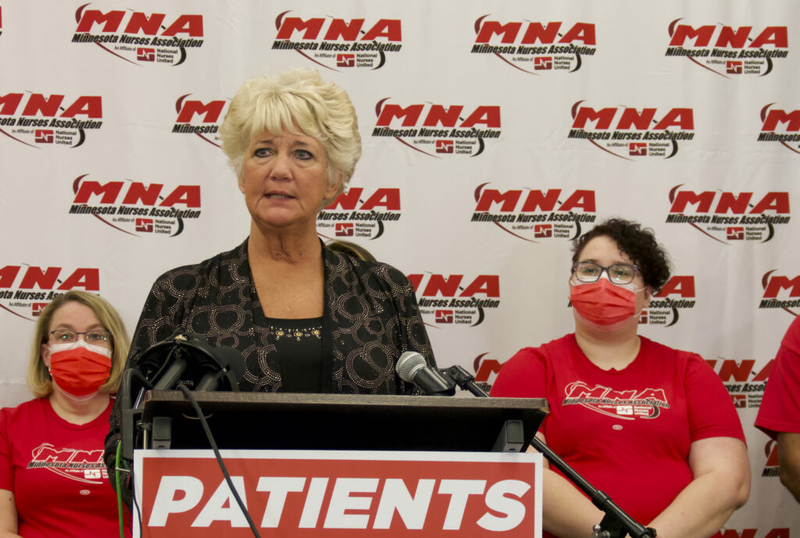15,000 Minnesota nurses will vote on second strike

Union leaders representing 15,000 nurses at hospitals across the Twin Cities and Duluth area said Thursday they will take a second strike authorization vote — after a three-day strike in September yielded little progress.
“Our hospital leadership have failed,” said Minnesota Nurses Association President Mary Turner during a news conference. “They have failed to solve the crisis conditions in our hospitals, and they have failed to settle a fair contract with us.”
The nurses’ union and hospital leaders at seven of Minnesota’s largest health systems have been negotiating for eight months, but talks remain stalled over wages and staffing levels. Turner said nurses have met with hospital leaders nine times since walking off the job in September.
Nurses will vote on Nov. 30, but Turner said the union has not decided when nurses would strike — or for how long — if their members authorize a work stoppage. The nurses’ union is required to give a 10-day notice to hospitals in order to give them time to make contingency plans.
The health systems that could be affected are Children’s Minnesota, HealthPartners, M Health Fairview, Allina Health, North Memorial, Essentia Health and St. Luke’s Duluth.
Nurses are seeking 30% pay increases over three years and a voice in staffing levels, which has thus far been a non-starter for hospital leaders. Hospitals have countered with about 12% increases over three years.
Hospitals have said the nurses’ demands are unrealistic and unaffordable amid soaring health care costs. Minnesota nurses are among the highest paid in the country, with the average registered nurse earning $39.40 an hour, or about $82,000 a year, according to the state’s Department of Employment and Economic Development.
Hospital leaders continue to push for mediation, which the nurses’ union has so far declined. Turner said on Thursday that it’s something they will “probably start to consider” and that it’s “never been off the table,” which hospital leaders took to mean the union has agreed to mediation.
A joint statement from several of the Twin Cities hospitals heralded that Turner “finally agreed to pursue mediation” and said hospital leaders are “committed to meeting as much as is practical to bargain through mediation to reach a contract settlement.”
A spokesman for the nurses’ union said the union has still not agreed to mediation and want to continue negotiating directly with hospital leaders face-to-face.
Allina Health accused the union of being “opportunistic” by holding a strike vote as hospitals grapple with a surge of RSV and influenza cases.
“With this vote, the union is choosing to be opportunistic at a time of vulnerability for our community by disrupting care,” the statement said.
Union nurses say they don’t want to abandon their patients but believe a strike could force hospitals to make changes that will improve patient care in the long run.
The Minnesota Nurses Association has made patient safety a central issue of their campaign and blasted hospital leaders for chronic understaffing, which they say is leading to more patient injuries and nurse burnout.
A recent report from the Minnesota Department of Health shows that adverse health events were up 33% in 2021 from 2020, while a recent survey from the Illinois Economic Policy Institute found a little more than half of nurses are considering leaving the profession in the next year, mainly because of what they say are unsafe staffing levels.
“Our emergency room has 15 hours of wait time. Workplace violence is increasing, and every week we hear that someone has been assaulted,” said Shiori Konda-Muhammad, a nurse at North Memorial Health, during Thursday’s news conference.
The nurses tried to win a greater say in staffing levels at the state Legislature earlier this year with “The Keeping Nurses at the Bedside Act.” That bill, which failed to make it out of committee in a Republican-controlled Senate, would have required hospitals to implement a staffing plan approved by a committee made up of nurses and managers.
The nurses could have success with the bill in the coming legislative session with Democrats in full control of the Legislature and governorship. However, Turner said nurses are not ready to drop their demands over staffing in union negotiations, even if given assurances from lawmakers that the staffing bill would pass.
“No. That’s not an option right now to sit and wish for something like that,” Turner said.
*This story has been updated with comment from hospital representatives.








